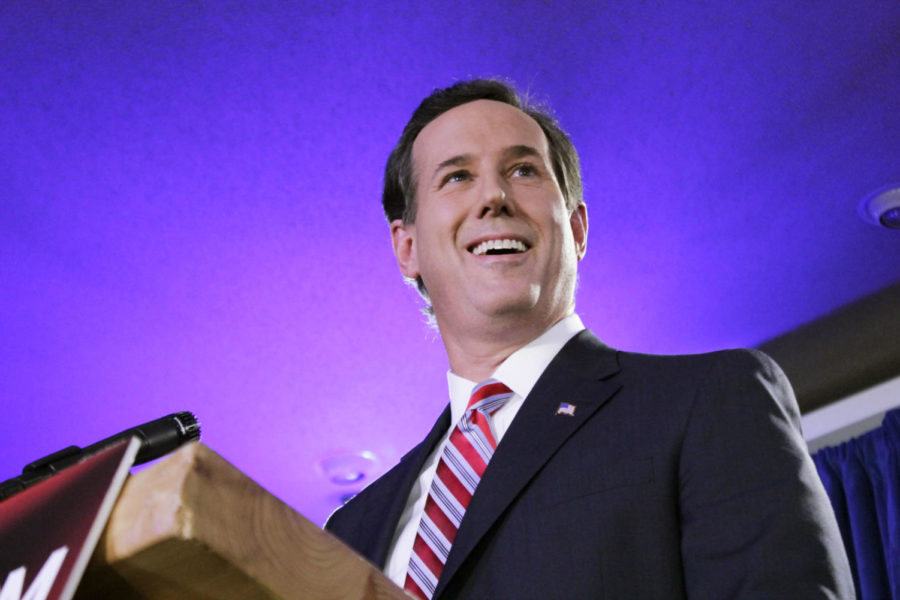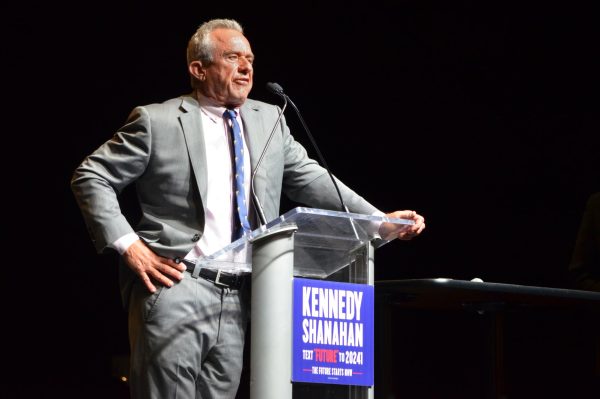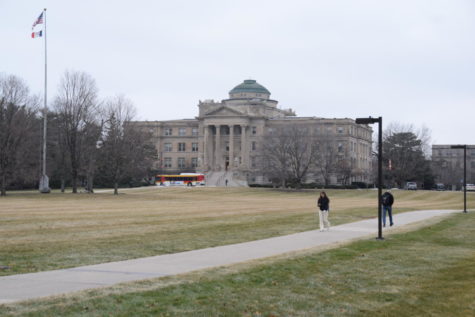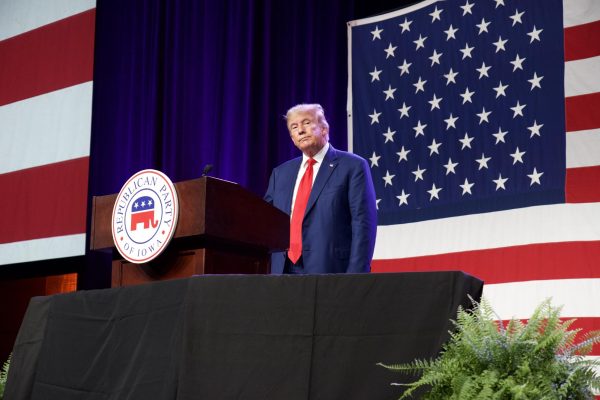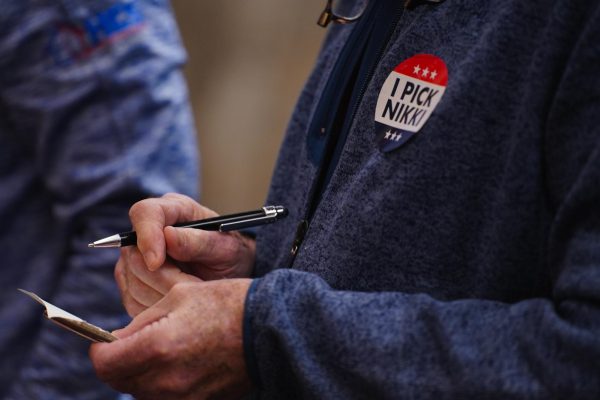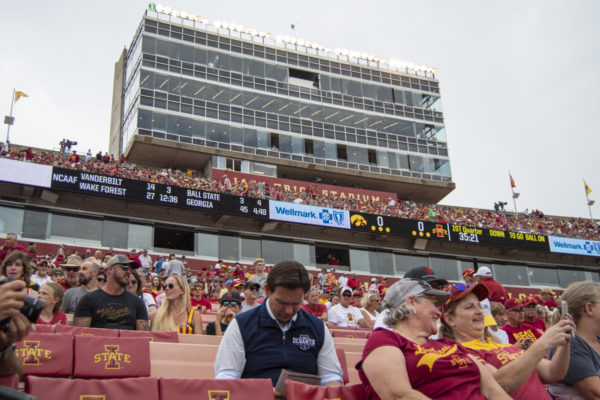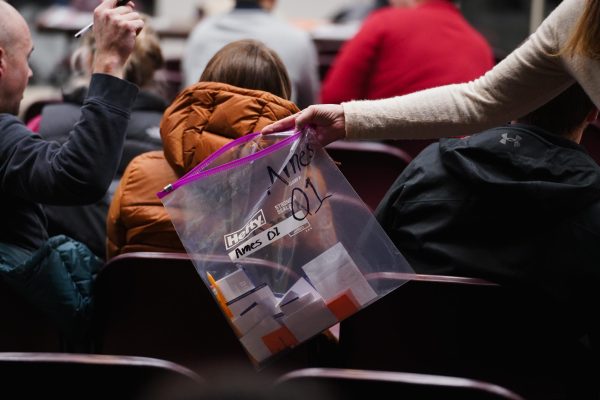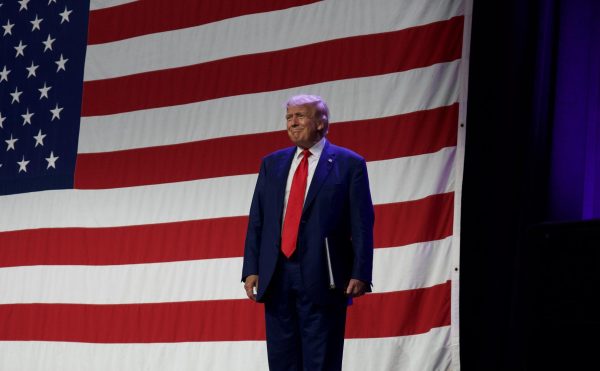Santorum projected to win in Missouri, Minnesota and Colorado
Rick Santorum, former Pennsylvania congressman, jokes about the abundance of Pizza Ranch restaurants in Iowa while addressing the crowd at his post-caucus party at Stoney Creek Inn in Johnston on Tuesday, Jan. 3. He attributed Iowa’s cuisine, notably that present at the Iowa State Fair, for the “reason I don’t have my jacket buttoned up tonight.”
February 8, 2012
Rick Santorum won the Missouri primary, Colorado caucuses and will win the Minnesota caucuses, CNN projected Tuesday in results that reshaped the Republican presidential race by raising questions about front-runner Mitt Romney’s ability to attract broad conservative support.
Santorum led in Minnesota with 45 percent support to 27 percent for Texas Rep. Ron Paul, 17 percent for Romney and 11 percent for Newt Gingrich, with 74 percent of the total counted, according to the secretary of state website.
The victory in a state Romney won in his unsuccessful 2008 presidential bid was a strong statement by Santorum that he represents a major conservative challenge to the former Massachusetts governor and Gingrich, the former House speaker.
With 99 percent of the Missouri vote counted, Santorum had 55 percent to 25 percent for Romney and 12 percent for Paul, according to unofficial state returns. Gingrich didn’t make the ballot in Missouri.
The non-binding Missouri primary had no delegates at stake, but such a dominating victory by the conservative Santorum showed his appeal to the state’s large blocs of evangelical and tea party supporters.
“Conservatism is alive and well in Missouri and Minnesota,” Santorum told cheering supporters outside St. Louis, Mo. Wearing a presidential suit instead of his trademark sweater vest, he boasted of his triumph over Romney, saying “we doubled him up” in both Missouri and Minnesota.
In Colorado, with nearly 12 percent of the precincts reporting, Santorum had 44 percent of the tally in the state’s GOP caucuses, the state’s Republican Party reported on its website. Romney was in second, with 28 percent, followed by Gingrich and Paul, with 15 percent and 13 percent percent, respectively.
The Minnesota and Colorado caucuses put a total of 70 delegates up for grabs in the biggest haul so far of the GOP nominating process.
While the two caucus states didn’t officially award delegates Tuesday — that will happen down the road at district and state conventions — the news media, including CNN, will use them to make unofficial delegate count estimates.
In his victory speech, Santorum continued his criticism of Romney as a moderate who would be unable to defeat President Barack Obama in November.
The former Pennsylvania senator also unleashed a harsh assessment of Obama, engaging in a responsive exchange with the crowd that repeated how the president thinks he’s smarter than the American people and tells them what to do instead of listening to them.
Santorum is competing with Gingrich for conservative support to try to slow the momentum of front-runner Romney, who had won two straight contests and three of the five before Tuesday.
His strong showing Tuesday bolstered his argument that he is the strongest conservative contender to challenge the more moderate Romney for the nomination and then Obama in the November election.
“I don’t stand here and claim to be the conservative alternative to Mitt Romney,” Santorum declared. “I stand here to be the conservative alternative to Barack Obama.”
Romney’s campaign spokeswoman Andrea Saul responded to Santorum’s Missouri victory by noting no delegates were at stake. Santorum also mounted the strongest campaign in the Show Me State.
An aide to Obama, meanwhile, said on condition of not being identified that the Santorum victory in Missouri was a sign that the base of the Republican Party doesn’t trust Romney. Romney should be locking up the nomination, not losing contests, the Obama aide said, adding that weakness will follow Romney into the general election.
In Missouri, a state official told CNN that the turnout would be “significantly lower than predicted.” The secretary of state’s office had estimated turnout would be 23 percent percent.
Romney’s campaign appeared to consider Colorado its best chance of victory Tuesday. He canceled stops in Minnesota scheduled for Monday to concentrate on Colorado, where he spent caucus night.
Romney, who won big in the state’s 2008 caucuses, has been working Colorado since last summer and arguably has the strongest structure in the state.
However, his team tried to tamp down expectations Tuesday, releasing a memo acknowledging the possibility of a loss in one of the day’s contests.
“Of course, there is no way for any nominee to win first place in every single contest,” wrote Romney’s political director, Rich Beeson. “John McCain lost 19 states in 2008, and we expect our opponents to notch a few wins, too.”
Specifically, Romney’s campaign signaled Monday that it considered Santorum as a major threat in Minnesota and Colorado.
Santorum needed victories or an overall strong showing to prove the viability of his campaign.
“I think we need to win in the sense that we need to perform very well,” he told CNN’s John King earlier Tuesday. “I think we’re going to run ahead of Speaker Gingrich, at least, obviously [in] Missouri [where] he’s not on the ballot. We feel very comfortable that we can run ahead of him in one and maybe both the other states, even potentially win one of those states.”
Paul, meanwhile, predicted his focus on the caucus states would yield results. He spent the past week stumping in Colorado and Minnesota and spent Tuesday night in Minnesota. “We’re gonna win some delegates. Whether we come in one or two or three, I don’t know exactly that,” Paul said on CNN’s “John King USA.” “But we feel positive about moving along and picking up more delegates. We’ll have to wait and see.”
— Jim Acosta, John Helton, Kevin Liptak, Rachel Streitfeld, Alan Silverleib, Jessica Yellin and Peter Hamby contributed to this report.

